Key Insights from My Future of Work Keynote at IAG 2018
New Title
Recently I had the pleasure of keynoting once again at the annual Interdepartmental Accounting Group conference in Brisbane on the topic of The Future of Work.
The Workplace of the Future is something that fascinates me deeply, largely due to the fact it has such huge implications on resourcing talent and training high performing teams.
In the last 5 years alone, we’ve noticed a changing spectrum of skills we need to look for when recruiting on behalf of our clients, and as leaders ourselves, it is crucial we know what training and development areas we need to focus on to continue to be competitive in the future.
People are often surprised, at first even sceptical, when I talk about the impact the Workplace of The Future is already having let alone what it is predicted to have in a few years time.
To that point the first poll I conducted at IAG was around the question:
What percentage of the activities we perform at work could be replaced by EXISTING technologies?
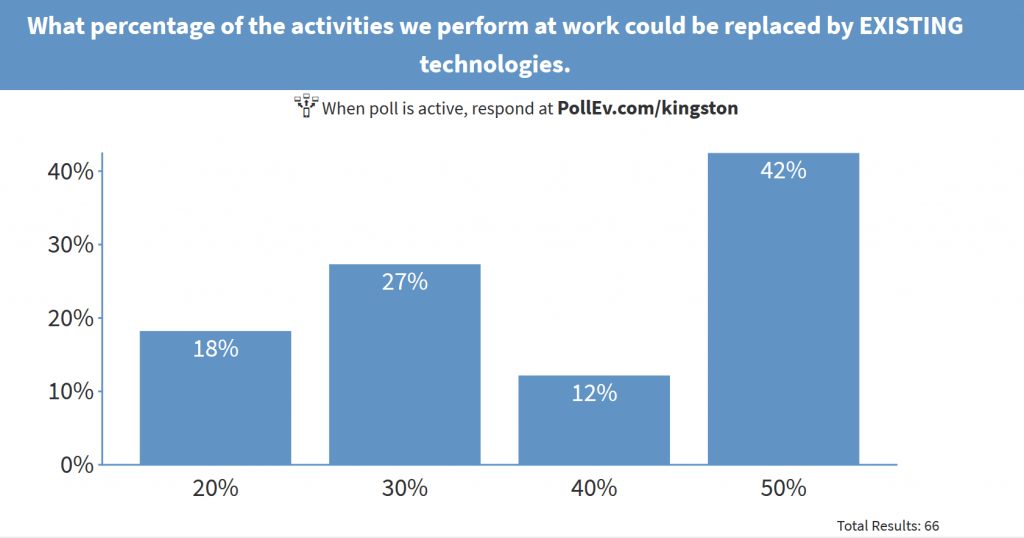
What would you have guessed? If you said 50% like 42% of the audience did you would be correct.
What was interesting for me was half the audience assumed only 20-30% of the activities we perform at work could be replaced by existing technologies.
The point is the Workplace of the Future is here, is already making an impact and we need to start preparing now.
One thing to note at this point, the Future of Work isn’t about getting ready for new technology or how to use it, far from it, it has a lot to do with the changing nature of skills that matter.
For instance, by the year 2022, the following skills are predicted to decline:
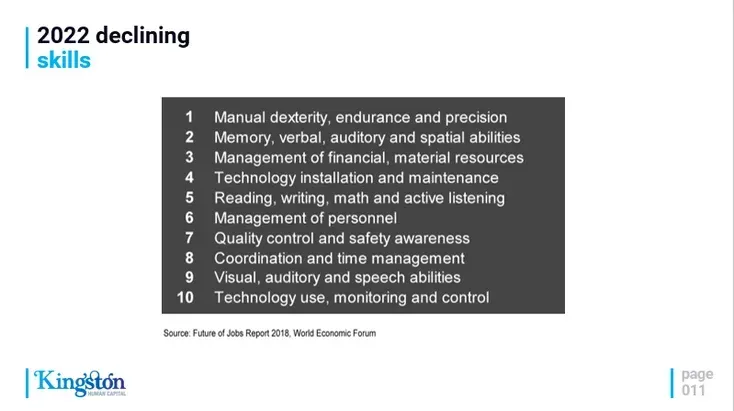
Skills on the decrease will be things like manual dexterity, which we can see with the changes in McDonalds push for full automated restaurants. Flipping burgers and handing cash no longer require humans at the McDonalds at Sydney airport.
Skills growing on the other hand include analytical thinking and active learning:
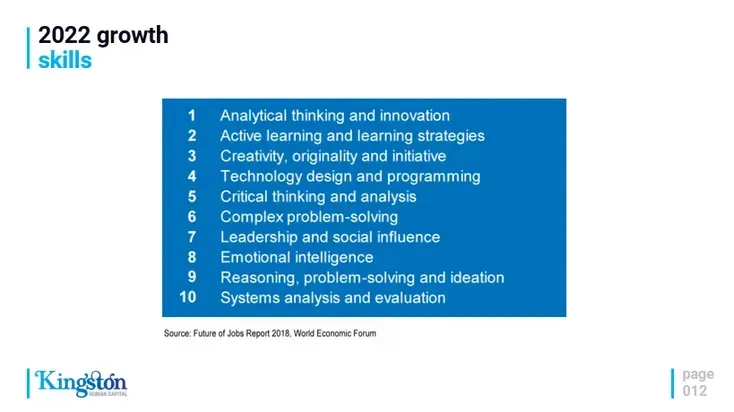
“Human” skills such as creativity, originality and initiative, critical thinking, persuasion and negotiation will likewise retain or increase their value, as will attention to detail, resilience, flexibility and complex problem-solving.
We can see that leadership and social influence are number seven on the list of skills that we need to develop, where the need for managers of personnel was on the decrease.
Here is more detail around 6 key skills around what employers want the most in 2022:
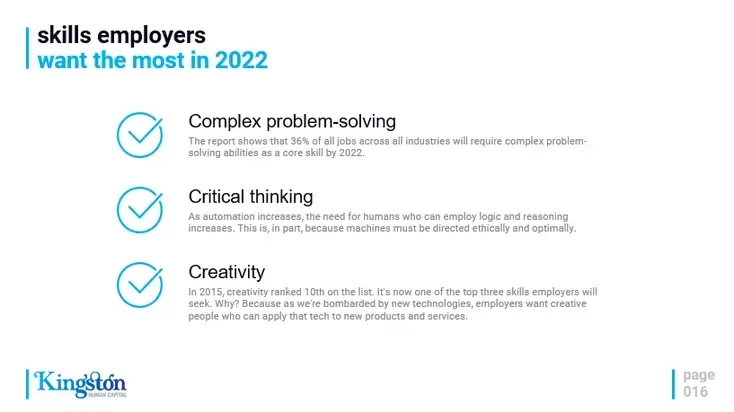
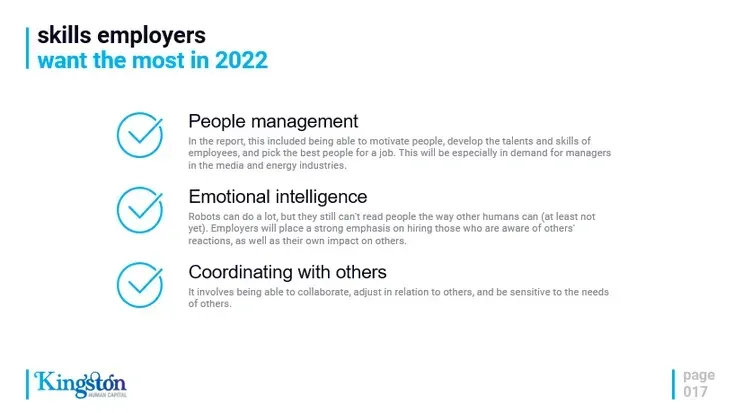
What does this all mean for our own learning and development?
The World Economic Forum (WEC) warns us that by 2022, no less than 54% of all employees will require significant re- and upskilling. That’s over half the entire workforce!
Employers indicate that they are set to prioritise and focus their re- and upskilling efforts on employees currently performing high-value roles as a way of strengthening their enterprise’s strategic capacity, with 54% and 53% of companies, respectively, stating they intend to target employees in key roles and in front-line roles which will be using relevant new technologies.
The WEC has also figured out how much time we need to be investing to prepare for the Workplace of the Future:
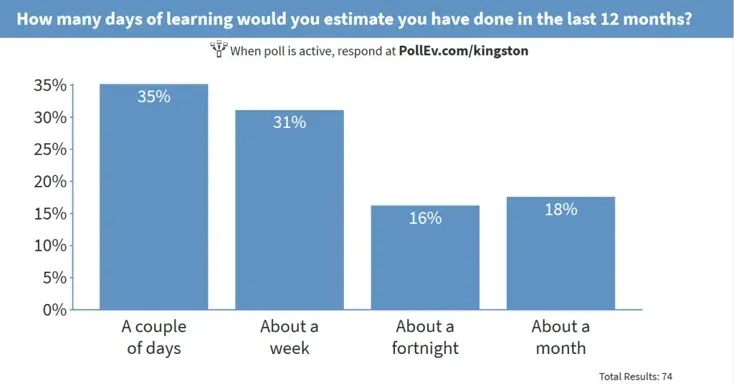
Over 80% of the audience at IAG estimated they are not hitting the recommended WEC quota of learning.
Why is this figure so high? Well it’s obvious: time constraints. But really, it’s perceived time constraints. Turns out the key is really figuring out how you learn best and coming up with a repeatable, easy way to consume information. It’s not supposed to be a chore.
For instance, are you a social learner? Consider attending quarterly events. Are you an auditory learner? Then podcasts and eBooks via Audible should be your new best friend. Or, maybe you're suited to the structured learning program of facilitated learning? Online or on-site courses may be for you.
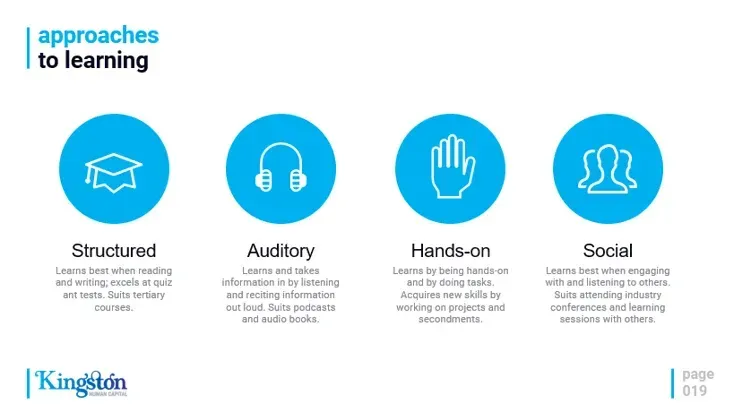
Then there’s things you can do at work like regular lunch and learns or better yet, hypothetical problem-solving scenario sessions designed to work those creative, analytical muscles.
Putting your hand up for special projects or secondments at work is also a great idea and mutually benefits both your organisation and the skill set you are trying to broaden.
Speaking of audio/visual learning, here is a 2-minute video we prepared on Easy Ways to Upskill for the Workplace of The Future:
Sure, the Future of Work can be viewed as cause of concern but at the same time should be seen as source of optimism and opportunity.
The key is being ready for it.








